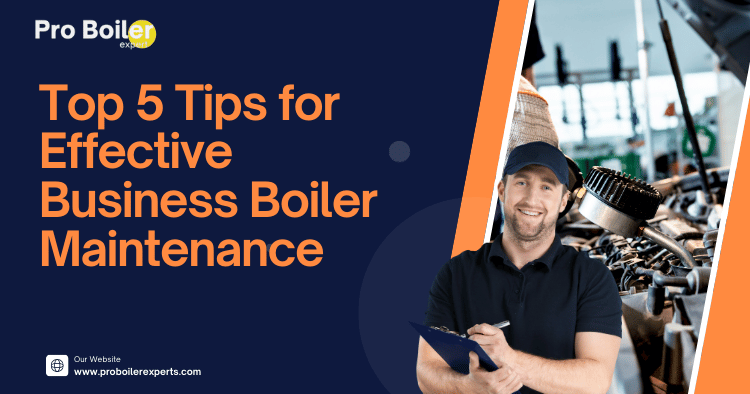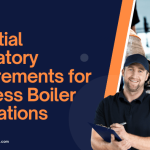Table of Contents
- Understanding Your Boiler System
- Regular Inspections and Maintenance
- Keep the System Clean
- Monitor Performance and Efficiency
- Schedule Professional Services
Maintaining a business boiler is essential for ensuring the efficiency and longevity of your heating system. A well-maintained boiler can save energy costs, minimize downtime, and enhance workplace safety. Here are the top five tips for effective business boiler maintenance that will keep your system running smoothly.
1. Understanding Your Boiler System
Before diving into maintenance, it’s crucial to understand your boiler system. Boilers can vary significantly in design and function, so familiarize yourself with the specifics of your model.
Key Components to Know:
| Component | Description |
|---|---|
| Burner | Ignites the fuel to produce heat. |
| Heat Exchanger | Transfers heat from the combustion gases to water. |
| Controls | Regulates temperature and pressure. |
| Safety Valve | Releases pressure to prevent explosions. |
| Circulator Pump | Distributes heated water throughout the system. |
Understanding the key components of your boiler can empower you to take proactive measures in maintenance.
By knowing the functionality of these components, you can better identify issues and understand the importance of each part during maintenance.
FAQs:
- How can I find my boiler’s manual?
Most manufacturers provide manuals online. You can often find them on their official websites or by contacting customer support. - What are common boiler types?
Common types include combi boilers, system boilers, and conventional boilers. Knowing your type helps in understanding specific maintenance needs.
2. Regular Inspections and Maintenance
Regular inspections are vital for catching potential issues early and ensuring optimal performance. Schedule these checks monthly or quarterly, depending on your usage.
What to Include in Your Inspection:
- Check Water Levels: Ensure the water levels are adequate to prevent overheating.
- Inspect for Leaks: Look for signs of leaks around pipes and connections.
- Examine Pressure Gauge: Ensure the pressure is within the recommended range.
- Listen for Unusual Noises: Gurgling or banging noises can indicate issues.
Regular checks can help you avoid costly repairs down the line. Early detection is key!
FAQs:
- How often should I perform maintenance?
Aim for at least once a year for a comprehensive service, plus regular checks every few months. - What should I do if I find a problem?
Document the issue and consult a professional immediately to avoid further damage.
3. Keep the System Clean
A clean boiler runs more efficiently and lasts longer. Dust, debris, and soot can accumulate over time, negatively impacting performance.
Tips for Keeping Your Boiler Clean:
- Dust and Vacuum: Regularly dust around the boiler and vacuum any accessible areas.
- Clean the Burner: Ensure the burner is free from dirt and debris to maintain combustion efficiency.
- Check the Flue: Ensure the flue is clear to prevent blockages that might cause back pressure.
Cleaning your boiler is not just about aesthetics; it plays a crucial role in operational efficiency.
Visual Aid:
FAQs:
- Can I clean my boiler myself?
Some basic cleaning tasks can be done yourself, but always refer to your manual and consider professional help for deeper cleaning. - What cleaning products should I use?
Use manufacturer-recommended cleaning products to avoid damaging components.
4. Monitor Performance and Efficiency
Keep an eye on your boiler’s performance. Any deviations from normal operation could signal a problem.
Key Performance Indicators to Monitor:
| Indicator | What to Watch For |
|---|---|
| Fuel Consumption | An unexpected spike may indicate inefficiency. |
| Temperature Fluctuations | Inconsistent heating can point to issues. |
| Pressure Readings | Ensure readings are stable and within range. |
| Emissions | Increased emissions can indicate combustion issues. |
Monitoring performance is not just about keeping warm; it’s about maintaining a cost-effective operation.
FAQs:
- How can I track efficiency?
Install a monitoring system that checks fuel usage, temperature, and pressure regularly. - What should I do if I notice inefficiencies?
Document your findings and consult a professional for an in-depth evaluation.
5. Schedule Professional Services
While regular maintenance is essential, professional servicing is crucial for keeping your boiler in top shape. A trained technician has the experience and tools to perform a thorough inspection and service.
What to Expect During Professional Service:
- Comprehensive Inspection: A detailed examination of all components.
- System Testing: Pressure and efficiency testing.
- Safety Checks: Ensuring all safety mechanisms are functional.
Investing in professional services now can save you from expensive repairs later.
FAQs:
- How often should I hire a professional?
At least once a year, or more frequently if your boiler operates under heavy usage. - What qualifications should a technician have?
Look for licensed professionals with experience in commercial boiler systems.
In conclusion, the maintenance of business boilers is paramount for ensuring safety and efficiency. By understanding your system, conducting regular inspections, keeping everything clean, monitoring performance, and scheduling professional services, you can secure the longevity and reliability of your boiler.
Remember, a well-maintained boiler is not just a matter of comfort; it’s essential for your business’s operational success!
For more detailed information on boiler maintenance, check out resources like Essential Boiler Maintenance Tips or explore the differences between various boiler types, such as Gas vs Oil Boilers.





